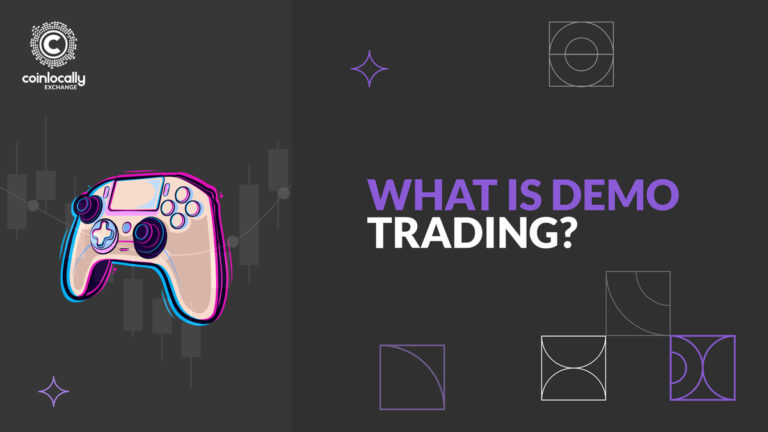Demo trading, also known as paper trading or virtual trading, is a practice in which individuals simulate trading activities without using real money. It provides a risk-free environment for beginners and experienced traders alike to test and practice their trading strategies, analyze market conditions, and familiarize themselves with trading platforms. Quick Getaway: Looking for the best demo trading account? Sign up with Coinlocally and learn how to invest in cryptocurrency. Table of Contents • What is Demo Trading? • What is a demo trading account? • Practice Trading Accounts • Virtual Trading Simulations • Free Trading Demos • Advantages of Free Trading Demos • Simulated trading tools • Risk-free trading trials • Learn with Demo Accounts • Conclusion What is Demo Trading? Demo trading typically involves using a simulated trading account provided by brokers or trading platforms. These accounts mirror the features and functionality of real trading accounts but use virtual funds instead of actual money. Traders can access real-time market data, execute trades, and monitor their positions just as they would in live trading. The primary purpose of demo trading is to gain practical experience and confidence in trading without the financial risks associated with real trading. It allows individuals to refine their trading strategies, learn how to use different order types, and understand the impact of market fluctuations on their positions. Demo trading is particularly beneficial for beginners as it helps them understand the mechanics of trading, learn about risk management techniques, and develop their trading skills. It also provides an opportunity to explore different asset classes, such as stocks, currencies, commodities, or cryptocurrencies, and assess their suitability for trading. Experienced traders can also utilize demo trading to test new strategies or experiment with trading techniques without risking real capital. They can evaluate the effectiveness of their trading plans and make adjustments as needed before implementing them in live trading. However, it’s important to note that while demo trading can provide valuable practice, it may not fully replicate the emotional and psychological aspects of real trading. The absence of real money at stake can affect decision-making and risk management. Therefore, transitioning from demo trading to live trading requires careful consideration and adjustment. What is a demo trading account? On their trading platforms, brokers offer a type of account called a demo account that mimics the real market environment. The main difference is that virtual money is used for trade instead of real money. Because of this, there can never be any real money losses when utilizing a demo account. There might be a few minor differences, even though it strives to mimic real trading conditions as closely as possible (e.g., order rejection or execution). Practice Trading Accounts A practice trading account, also known as a demo trading account, is a simulated trading platform that allows individuals to practice trading financial instruments without risking real money. Such accounts are typically offered by brokers or trading platforms and provide users with a virtual balance to trade with. The purpose of a demo trading account is to provide beginners with a risk-free environment to learn and gain experience in trading. Users can familiarize themselves with the trading platform’s features, test different trading strategies, and observe the market’s behavior without the fear of losing actual funds. You may also like to be familiar with the Best Crypto trading Bot for Beginners. A demo trading account usually replicates the real trading environment, including real-time market data and price movements. However, the trades executed within these accounts do not have any financial impact on the user’s actual funds or the market. While a demo trading account is beneficial for learning and honing trading skills, it’s crucial to note that it may not fully replicate the trading psychology aspects of real trading. The absence of real money at stake can impact decision-making and risk management. Therefore, transitioning from a practice trading account to a live trading account requires additional considerations and adjustments. Virtual Trading Simulations Virtual trading simulations, also known as stock market games or fantasy trading leagues, are online platforms that simulate real-world trading scenarios for educational or entertainment purposes. These simulations allow participants to experience the dynamics of trading stocks, bonds, options, or other financial instruments without using real money. In a virtual trading experience, participants are typically provided with a virtual budget or virtual currency which they can use to buy and sell securities. The simulations often use real-time market data, allowing participants to make trades based on current market conditions. These simulations aim to provide a risk-free environment for individuals to learn about investing and trading strategies. Participants can practice analyzing market trends, the best cryptocurrency to invest, and managing portfolios without the potential financial consequences of real trading. Virtual trading simulations may also include educational resources and tools to help participants understand various aspects of investing, such as fundamental analysis, technical analysis, and risk management. Some platforms even offer competitions or leaderboards to encourage participants to compete against each other based on their trading performance. These simulations can be useful for beginners who want to learn about investing, as well as for experienced traders who want to test new strategies or experiment with different investment approaches. It’s important to note that while virtual trading simulations can provide valuable learning experiences, they may not fully replicate the emotions and psychological aspects of real trading. The absence of real financial risk can impact decision-making and may not accurately reflect the challenges and pressures of live trading. Free Trading Demos Free trading demos are simulated trading platforms that allow individuals to practice trading without the need to pay or deposit real money. These demos are typically offered by brokers, trading platforms, or financial institutions as a way to attract potential customers and provide them with a risk-free trading experience. Free trading demos function similarly to real trading accounts, providing users with virtual funds to practice buying and selling financial instruments such as stocks, currencies,







